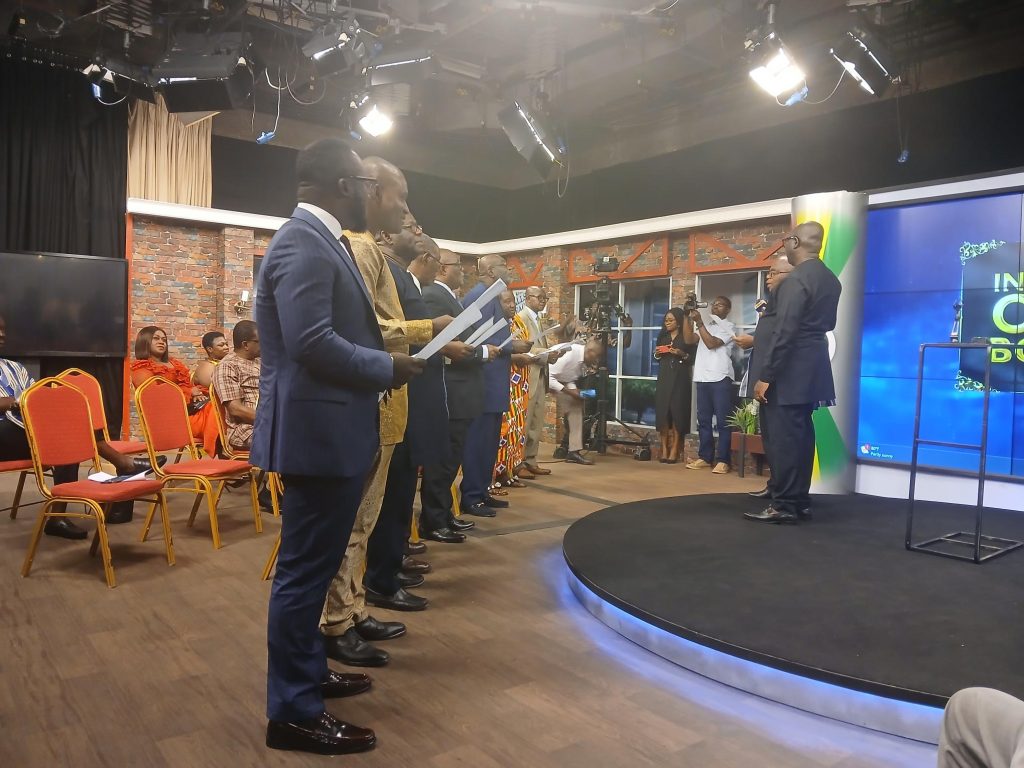By Eunice Hilda A. Mensah
Accra, Aug.13, GNA – Professor Samuel Kojo Intsiaba, the Chair of a newly inaugurated Board of the Ghana Broadcasting Corporation (GBC) says his team of Board members will ensure that GBC accrues no new debts and procures digitised studios.
He said GBC needed retooling to move from an analogue mode of operation to a more digitised one, hence appealed to the National Media Commission (NMC) to help it lay its needs before the government for help.
Prof Intsiaba made the appeal on Tuesday at an inauguration of a new Board of the Corporation in Accra.
One of the areas that needed attention, he said, was how to diversify the source of electricity for GBC, adding that it needed to go solar to be able to meet its energy needs.
The Board Chair said members would work with management to ensure that solar was introduced into the Corporation’s operations to ensure continuity and sustainability of work
Another area with a challenge was the constant need to procure an OB van for outdoor broadcasting or coverage of important national events, he said and gave an assurance that the Board would also work with management to resolve those challenges.
“The outgoing board helped to protect GBC lands and the new board will ensure we don’t lose the lands,” he added.
Prof Intsiaba said GBC had, however, over the years, gone through positive developments such as improved staff attitude to work and content creation, hence commended the past board for the success chalked and gave an assurance to work to make it better.
Professor Amin Alhassan, the Director-General of GBC, said GBC was poised to give good content to the public and working hard to reposition itself to take advantage of the new media landscape.
While welcoming the new Board, he said GBC had for years witnessed industrial harmony that fostered a rebound and progress.
He gave an assurance that the national broadcaster would continue to work in harmony to ensure that there is no destruction of operations and funds for staff welfare.
Mr George Sarpong, the Executive Secretary, NMC, said ownership, governance, funding, and programming were some of the ways a broadcaster was defined, adding that it was within those complexities that GBC was a public broadcaster, hence appealing to staff to always satisfy the needs of the public.
“Years back, I was watching GBC because that is what was available to watch but now, I watch GBC because it’s a station of my choice. We need to thank the management and staff of GBC for how far they have taken the Corporation,” he added.
Professor Samuel Debrah, the outgoing Board Chair of GBC, said his board ensured the implementation of a policy to move GBC from bureaucracy to business and had seen an improvement.
He said his board also ensured that there were competitive interviews which had not been held for a long time and financial stability, reorganisation and restructuring of regional management and reviewing of old policies with the addition of six new ones.
He commended the former Board led by Professor Emmanuel Adow-Obeng for bringing back professionalism and improving harmony with unionised staff and asked the new Board to use their expertise to take the Corporation to a greater height to the benefit of the entire populace.
Mr Yaw Boadu Ayeboafo, the NMC Chair, said the new Board members were selected because of their competence, and asked them to support management to make the Corporation a better one.
To the staff of GBC, he said: “When you are angry, be mindful of the words you use, because the words you have uttered will never be erased. So, try to resolve your internal problems well and possibly within.”

He also advised that GBC provided equal access to political parties and their spokespersons as the nation was approaching general elections to ensure balance and fairness, saying: “Nobody will punish a media institution for being professional but things can go wrong when it’s unprofessional.”
Other members of the new Board are Professor Kwaku Tanoh Debrah, Francis Dadzie, Peter Djakwah (An Engineer, National Communications Authority), Ama Serwa N-T (Secretary General of Ghana National Commission for UNESCO), Thomas Broni, Adjei Afriyie Nketia (a Lawyer and Expert in Public Administration), Raymond Kumah (Administrative Bishop of Perez Chapel), and Prof Amin Alhassan, the Director-General, GBC.
GNA